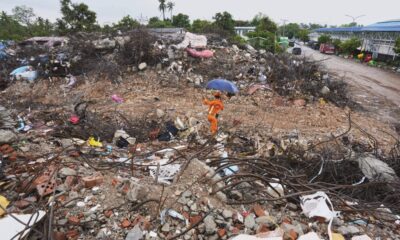World
Al-Qaida-Linked Group Sets Fuel Trucks Ablaze in Mali Blockade

A West African armed group affiliated with al-Qaida ignited a crisis in Mali over the weekend by setting fire to fuel tankers. This act, captured in videos circulating online, represents an escalation of the group’s efforts to control the economy by imposing a blockade on fuel imports from neighboring countries. The incident occurred in the Sikasso region, where trucks originating from the nearby Ivory Coast were targeted.
The militant group, known as Jama’at Nusrat al-Islam wal-Muslimin (JNIM), announced the blockade in a video released last week. According to a security source in Sikasso, the videos confirming the incident were verified by the Associated Press. The attack highlights the growing influence of JNIM, which is regarded as one of the deadliest armed groups in the Sahel region.
Mali’s transport ministry is currently convening with representatives from transportation associations to address these threats and seek solutions. The blockade is particularly concerning for Mali, which relies entirely on imports—primarily from Senegal and Ivory Coast—to meet its fuel demands.
Remadji Hoinathy, a security analyst at the Institute for Security Studies, emphasized the potential ramifications of the blockade. He noted that it will likely lead to fuel shortages, exacerbating economic difficulties for the landlocked country. Hoinathy warned that this tactic could extend across the region, as JNIM shifts its focus to regional economic infrastructure to increase pressure on governments.
“This is to bring more pressure on the military, the state, and their Russian partner,” Hoinathy stated. “It is a way of JNIM saying they are on the ground and have the capabilities of wreaking havoc.”
The Economic Community of West African States (ECOWAS) has faced challenges in addressing the surge of Islamist attacks throughout the region. Following a series of coups, Mali, Burkina Faso, and Niger withdrew from the bloc, opting to establish a multilateral security alliance in 2023. This shift marked a departure from long-standing Western partnerships, including those with France. Despite these changes, data indicate that attacks have increased since the formation of this new alliance.
As the situation evolves, the impacts of the blockade are likely to resonate beyond Mali’s borders, affecting regional trade and security dynamics. The international community is closely monitoring these developments, which underscore the complex interplay between militant groups and state responses in a region grappling with persistent instability.
-

 World3 months ago
World3 months agoScientists Unearth Ancient Antarctic Ice to Unlock Climate Secrets
-

 Entertainment3 months ago
Entertainment3 months agoTrump and McCormick to Announce $70 Billion Energy Investments
-

 Lifestyle3 months ago
Lifestyle3 months agoTransLink Launches Food Truck Program to Boost Revenue in Vancouver
-

 Science3 months ago
Science3 months agoFour Astronauts Return to Earth After International Space Station Mission
-

 Technology2 months ago
Technology2 months agoApple Notes Enhances Functionality with Markdown Support in macOS 26
-

 Top Stories2 weeks ago
Top Stories2 weeks agoUrgent Update: Fatal Crash on Highway 99 Claims Life of Pitt Meadows Man
-

 Sports3 months ago
Sports3 months agoSearch Underway for Missing Hunter Amid Hokkaido Bear Emergency
-

 Politics3 months ago
Politics3 months agoUkrainian Tennis Star Elina Svitolina Faces Death Threats Online
-

 Technology3 months ago
Technology3 months agoFrosthaven Launches Early Access on July 31, 2025
-

 Politics3 months ago
Politics3 months agoCarney Engages First Nations Leaders at Development Law Summit
-

 Entertainment3 months ago
Entertainment3 months agoCalgary Theatre Troupe Revives Magic at Winnipeg Fringe Festival
-

 Politics2 weeks ago
Politics2 weeks agoShutdown Reflects Democratic Struggles Amid Economic Concerns





















